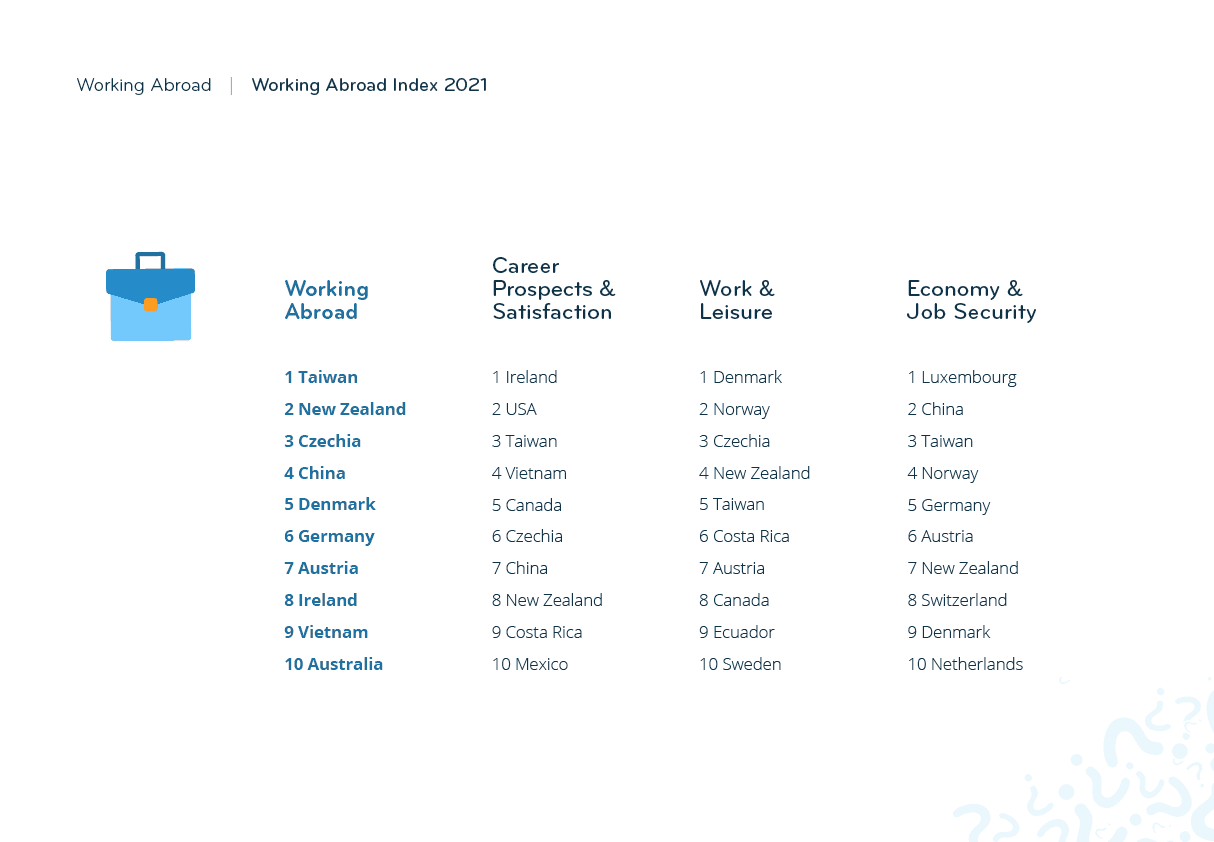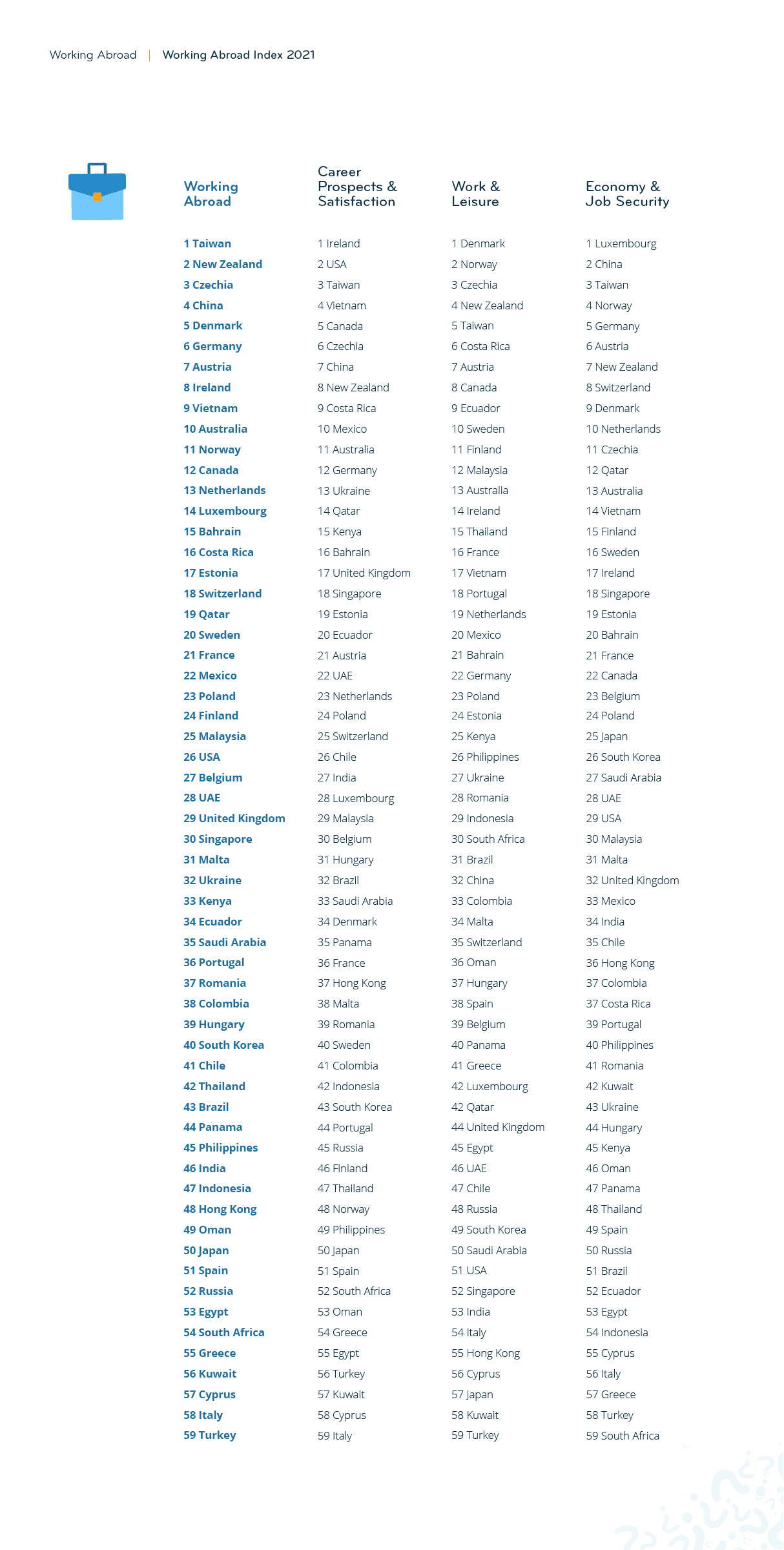Expats at Work: From Secure Jobs to Sinking Economies
The winners in 2021 — offering enviable job security and work-life balance — are no strangers to the top 10 of the Working Abroad Index, while three Mediterranean countries finish last.
Top Findings
- #1 Taiwan ranks highest for job security.
- #2 New Zealand impresses with its work-life balance.
- Expats in #3 Czechia are happy with their working hours.
- Turkey (#59), Italy (#58), and Cyprus (#57) bring up the rear.
- Expats highly value their career opportunities in Ireland and the USA.
The Top 10

Methodology
To determine the ranking in the Working Abroad Index, respondents were asked to rate six factors that were then grouped into three subcategories: Economy & Job Security, Career Prospects & Satisfaction, and Work & Leisure. Each of these factors was rated on a scale of one (very bad) to 7 (very good). The index includes 59 expat destinations, with at least 50 respondents necessary for a destination to be included in the results.
A Bright Employment Outlook in Taiwan
Taiwan, the overall winner for 2021, is also in the lead in the Working Abroad Index. Taiwan consistently ranks highly in this index. The respondents are especially pleased with their job security — 83% rate this favorably (vs. 61% worldwide). Two in five (40%) are even completely satisfied in this regard (vs. only 24% globally). An impressive 85% are also happy with the state of the local economy, compared to 62% worldwide. Taiwan’s success in quickly containing the COVID-19 pandemic has resulted in a very bright employment outlook for its residents.
Over two in five expats in Taiwan (41%) couldn’t be any happier with their job, which is almost twice the global average (22%). Interestingly, only 51% report being able to work remotely (vs. 78% globally). For another 15%, their employer does not allow remote work (vs. 6% worldwide). In any case, whether at home or in the office, expats in Taiwan with a full-time position work considerably fewer hours per week than the global average (39.9 vs. 43.2). And though there is not always a direct connection between the number of weekly working hours and the satisfaction with this factor, most expats in Taiwan do rate it positively (74% vs. 66% globally).
Balancing Work & Life in New Zealand
New Zealand comes in second place in 2021, with especially impressive results when it comes to work-life balance. With 83% generally satisfied in this regard (vs. 66% globally), close to two in five (39%) are even completely satisfied with their work-life balance (vs. 25%). Expats in New Zealand also feel their jobs are quite secure, with just over four in five (81%) rating their job security favorably (vs. 61% globally). Prospects are also good for those looking for a change, with 64% rating the local career opportunities positively, close to 20 percentage points above the global average (45%).
In terms of remote work, only 62% report being able to work from home (vs. 78% globally). For almost twice the global average (30% vs. 16%), this is not possible due to the nature of their work. One reason for this may be the 26% who work in the healthcare field (vs. 6% worldwide). And as New Zealand was also able to rapidly contain the COVID-19 pandemic, being able to work remotely is at least not as relevant in terms of personal health and safety.
Czechia Stays in the Top 3
Since 2017, Czechia has consistently ranked in the top 3 of the Working Abroad Index, and 2021 is no exception. It gets its best results in the Work & Leisure subcategory. Over four in five (82%) are generally satisfied with their working hours (vs. 66% globally). Expats in full-time positions in Czechia work an average of 41.5 hours per week, compared to a global average of 43.2 hours. Four in five (80%) are also happy with their work-life balance, a claim only slightly fewer than two-thirds (66%) agree with worldwide.
Three-quarters (75%) rate the state of the local economy positively, compared to only 62% worldwide. Close to three in five expats (59%) rate the local career opportunities positively (vs. 45% globally). One expat appreciates now having “a satisfying job that I had trouble finding in the US”. An impressive 93% of working expats in Czechia say they can do so remotely (vs. 78% around the world). One reason for this result may be Czechia’s above-average share of expats who are self-employed or freelancers (21% vs. 11% globally).
Turkey, Italy & Cyprus Hit Rock Bottom
The three worst-performing countries in the Working Abroad Index, Turkey (59th), Italy (58th), and Cyprus (57th), all end up among the bottom 10 in the overall ranking too. As far as working abroad is concerned, Turkey has consistently ranked in the bottom 10 since 2017. In 2021, a particularly large share of expats — more than twice the global average — are dissatisfied with the state of the local economy (43% vs. 19% globally). Turkey is currently struggling with an undervalued currency coupled with the impact of the COVID-19 pandemic on tourism.
The country also ranks last in the Work & Leisure subcategory: 32% of expats in Turkey are unhappy about their working hours, twice the global average of 16%. A Brazilian woman deplores the “collapsing currency, conservative and strict values at most workplaces, and long working hours”. Interestingly, however, expats in full-time positions actually work fewer hours in Turkey than the global average (41.9 hours per week vs. 43.2).
There are strict values at most workplaces, and long working hours.
Since the first Expat Insider survey in 2014, Italy has always ranked in the bottom 10 of the Working Abroad Index. In 2021, expats living there are particularly dissatisfied with the local career opportunities (56% negative ratings vs. 33% globally), with 22% describing them as very bad (vs. 10% globally). Over one-third of expats (36%) are not satisfied with their job security (vs. 20% worldwide), and 42% of expats give the state of Italy’s economy a negative rating (vs. 19% globally). At 9%, the country’s unemployment rate remains relatively high.
In Cyprus, only about half the expats (52%) are generally satisfied with their job (vs. 68% globally). In fact, close to a fifth (19%) are completely dissatisfied with this aspect of their life abroad (vs. 5% globally). One-quarter are also displeased with their working hours (25% vs. 16% worldwide). Moreover, Cyprus ranks last for job security, with 22% giving this factor the worst possible rating (vs. 7% globally).
Top Career Options & Work-Life Balance Flops
As for the three subcategories of the Working Abroad Index, Ireland ranks first in the Career Prospects & Satisfaction subcategory, with expats particularly pleased with the career opportunities. Seven in ten (70%) give this factor a positive rating (vs. 45% globally), with close to double the global average even saying they are very good (25% vs. 13% worldwide). The USA comes in second place, with nearly a quarter (24%) giving the local career opportunities the best possible rating (vs. 13% globally). On the other end of the spectrum, Kuwait comes third to last in this subcategory: over four in ten expats (42%) rate their local career opportunities negatively (vs. 33% globally).
Luxembourg leads the Economy & Job Security subcategory and is the clear winner regarding the state of the local economy. More than half the respondents (53%) say it is very good (vs. 20% globally), and two-thirds (67%) are satisfied with their job security (vs. 61% globally). China comes second in this subcategory, with 87% pleased with the local economy (vs. 62% worldwide). South Africa, however, ranks last for both the subcategory and the state of the local economy, with 18% even describing the latter as very bad (vs. a global 4%). In Greece — which ranks 57th in the subcategory — over four in ten expats (43%) also rate the state of the local economy negatively (vs. 19% worldwide), and 32% are worried about their job security (vs. 20% globally).
Two Scandinavian countries take the top spots in the Work & Leisure subcategory. Nearly half the expats in Denmark (49%) are completely satisfied with their working hours (vs. 27% globally), and 44% couldn’t be happier with their work-life balance (vs. 25% worldwide). Norway sees similar results, with 42% fully satisfied with their working hours. Kuwait also ranks badly in this subcategory, with 12% very displeased with their work-life balance (vs. 4% globally). In Japan, only half the expats (50%) are happy with their working hours (vs. 66% worldwide). Expats in full-time positions work an average of 44.9 hours per week there, compared to 43.2 hours globally. As a US American man puts it: “The work-life balance here is atrocious.”
The work-life balance in Japan is atrocious.
Trends in the Top & Bottom 10
All of the top 10 destinations in the Working Abroad Index can be found in the European or Asian-Pacific regions. Vietnam (9th) even ranks first for overall job satisfaction. Australia (10th) — similarly to New Zealand — does quite well in terms of local career opportunities, where it ranks fifth. Germany (6th) ranks highest for job security, where it comes in sixth place.
The bottom 10 all perform badly in the Career Prospects & Satisfaction subcategory. Egypt (53rd) performs worst for local career opportunities, coming in 56th place. Spain (51st) has its worst results for overall job satisfaction and job security (53rd place for both).
Further Reading
- Complete Expat Insider 2021 Country Ranking Report (PDF)
- The Best & Worst Places for Expats in 2021
- Regional Report: Asian Tigers
- Country Report: Czechia
- Country Report: Italy
- Forbes: Amid Covid-19 Layoffs Elsewhere, Taiwan Expects Hiring Spree to Accelerate
- BBC News: How did New Zealand become Covid-19 free?
- The New York Times: Turkey Braces for Yet Another Currency Crisis
- Trading Economics: Italy Unemployment Rate
Full Ranking

Advertisement
Join InterNations
The community for expats worldwide
Download

